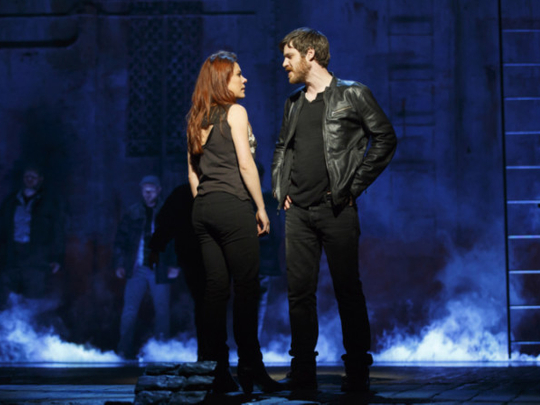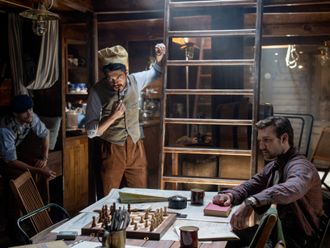
You may be tempted upon leaving Sting’s Broadway musical The Last Ship to head straight to drain a pint and sing some sea shanties. Or maybe go weld something. Or do both.
Such are the foot-stomping, testosterone-filled feelings that emerge from the Neil Simon Theatre, where a blast of British working class camaraderie among steel workers has docked during these times when we only construct things from Ikea.
The Last Ship has some powerful performances, some outstanding songs, real heart and a creative team that uses every inch of the stage in thrilling ways. Perhaps there’s a bit of bloat and far too many sea references, but when it works, it does so brilliantly.
The show is Sting’s semi-autobiographical story about a prodigal son who returns to his northern England shipbuilding town to reclaim the girl — and a son — he abandoned when he fled 15 years before. The shipyard, meanwhile, is closing and the workers are divided over the future. The show is about loss and letting go.
Michael Esper (American Idiot) plays the hero, somehow making a man potentially unlikable into someone melancholy and sick at heart. Rachel Tucker is fiery and strong and superb as his love interest, both protective and vibrant. Jimmy Nail is a great as the softhearted foreman with a gruff exterior, and Fred Applegate is irrepressibly good as a profane priest.
Steven Hoggett’s special brand of choreography — unexpected dancers swaying in unison, slo-mo kicks — is particularly effective here. As he’s done in Once, and The Curious Incident of the Dog in the Night-Time, he turns the un-lithe and the downright rotund into lighter-than-air expressions of dreamlike movement.
The project began as a CD and PBS concert special before it was turned into a stage version. Sting drew on his childhood, growing up in Newcastle’s Wallsend neighbourhood, near the Swan Hunter shipyards. David Zinn’s sets are not surprisingly all about steel — girders and ladders and gates and rust-stained hulls. There’s even rain and acetylene torches.
Pulitzer Prize- and Tony-winning lyricist Brian Yorkey (Next to Normal) and Tony-winner John Logan (Red) wrote the book, plugging into the noble honour and passion of men and women who build things without romanticising everyone. A love triangle at the story’s heart is deftly navigated, with no one cartoonishly evil. They’ve even salted the script with references to domestic violence.
Tony-winner Joe Mantello (Wicked) directs with the skill of a master craftsman: Adrenalin-fueled scenes of men at each others’ throats are flawlessly followed by candlelit, tender ones. He manages to steer away from simple, sticky-sweetness and stabs at an aching wistfulness, aided by gloomy, evocative lighting by Christopher Akerlind.
Sting’s stage composing is nicely complex, mixing sassy ballads with brooding duets and big, violin-led crowd pleasers. Outstanding are Dead Man’s Boots and The Night the Pugilist Learned How to Dance, which here is wonderfully staged between a father and son behind bars, and the simply beautiful title track, which the creators clearly know is good: It’s leaned on no less than four times.
Some songs on the CD never made it to the stage and Sting opened his rich catalog for some repurposing. You’ll hear Ghost Story from the album Brand New Day, Island of Souls and All This Time from The Soul Cages and When We Dance from Fields of Gold.
What’s remarkable is the old tunes fit flawlessly, proof Sting’s songs have always been built of strong stuff and often reached back to his hometown. The writers also have plundered imagery from Sting’s old lyrics to build their story, particularly Island of Souls.
Broadway has something of a crush with the Irish and English right now. There’s Once and The Curious Incident of the Dog in the Night-Time and Matilda and Kinky Boots. Hopefully there’s room for another — an unlikely moving musical about shipbuilders.












